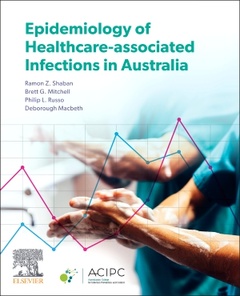Description
Epidemiology of Healthcare-Associated Infections in Australia
Authors: Shaban Ramon Z., Mitchell Brett G., Russo Philip, Macbeth Deborough
Language: English
Subject for Epidemiology of Healthcare-Associated Infections in...:
Keywords
<; p>; Epidemiology of Healthcare-associated infections in Australia; Ramon Z; Shaban; Brett G; Mitchell; Philip L; Russo; Deborough Macbeth; Shaban; Mitchell; Russo; Macbeth; Epidemiology; HAIs; 9780729543637; Healthcare-associated infections; healthcare infection; infection; hospital infection<; /p>
51.78 €
In Print (Delivery period: 14 days).
Add to cart124 p. · 21.5x27.6 cm · Paperback
Description
/li>Contents
/li>Biography
/li>
Endorsed by the Australasian College for Infection Prevention and Control (ACIPC)
ACIPC is the peak body for infection prevention and control professionals in the Australasian region.
Healthcare-associated Infections (HAIs) are a major threat to patient safety and the quality of healthcare globally. Despite this, Australia does not have a nationally coordinated program for the surveillance and reporting of HAIs. Epidemiology of Healthcare-associated Infections in Australia is Australia's first peer-reviewed, evidence-based assessment of the epidemiology of HAIs using publicly available data from hospital-acquired complications (HACs), state-based surveillance systems and peer-reviewed and grey literature sources.
This important work has been compiled by some of Australia's leading infection control professionals and researchers. It will build national consensus on definitions, surveillance methodology and reporting of the incidence of HAIs. In doing so, it provides hospitals and those working in infection prevention and control an opportunity to benchmark and evaluate interventions to reduce infections and ensure transparency on reporting methods that will strengthen Australia's efforts to prevent and control HAIs.
Here is a great article published in Sydney Morning Herald on the publication of Epidemiology of Healthcare-associated infections in Australia.
- Collated publicly available HAI surveillance definitions from jurisdictions across Australia
- Collated publicly available national HACs HAI data derived from the associated surveillance programs
- Identification of the gaps in both publicly available HAI data from different sources and the lack of publicly available HAI surveillance data in one serialised title
- Supporting video summarising key content
- Available in eBook format with print-on-demand option
Professor Brett G. Mitchell BN, DipTropN, CertHealthM, GradCertTeachSuper, MAdvPrac, PhD, RN, CICP-E, FACN, FACIPC Professor of Nursing and Health Services Research, School of Nursing and Health, Avondale University, Lake Macquarie, New South Wales, Australia; Conjoint Scholar, Central Coast Local Health District, Gosford Hospital, New South Wales, Australia; Adjunct Professor of Nursing, School of Nursing and Midwifery, Monash University, Melbourne, Victoria, Australia; Infection Prevention and Control Lead, Infection Research Program, Hunter Medical Research Institute, Newcastle, New South Wales, Australia; Editor-in-Chief, Infection, Disease and Health, Australasian College for Infection Prevention and Control, Sydney, New South Wales, Australia
Professor Philip L. Russo BN, MClinEpid, PhD, RN, CICP-E, MACN, FACICPC Professor of Nursing and Director of Research, School of Nursing and Midwifery, Monash Universit

